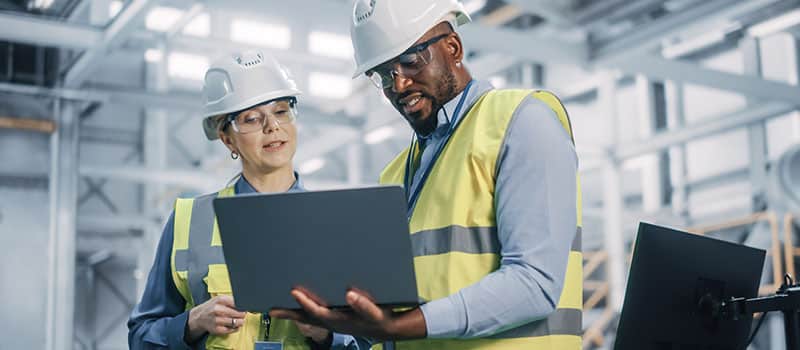The rapid development of artificial intelligence (AI) technology is revolutionising industries across the globe, and construction is no exception. Managing complex construction projects has always been a significant challenge that takes up a large amount of time. However, AI construction software solutions are emerging as a way to streamline this process and improve project outcomes across the sector.
The Role of AI in Modern Construction
AI-powered tools are becoming increasingly common in the construction industry, offering a variety of benefits:
- Streamlined Project Management: AI allows better scheduling, resource allocation, and tracking, saving time and minimising delays.
- Better Precision and Reduced Errors: AI ensures greater accuracy in designs, cost estimates, and on-site safety monitoring.
- Improved ROI: Construction companies can optimise resources and reduce waste, boosting profitability in the process.
Examples of Artificial Intelligence in Construction
There are many examples of artificial intelligence in construction, and the benefits it can provide:
AI-driven project management tools simplify the planning and execution of complex construction projects. These tools help with:
- Automating scheduling and resource allocation.
- Predicting potential delays and suggesting adjustments.
- Tracking progress in real-time for better decision-making.
The potential for AI in construction drawings is vast. Automated drafting and design tools are transforming how architects and engineers approach construction planning,
by:
- Generating precise, error-free drawings.
- Ensuring compliance with building regulations.
- Accelerating project timelines by automating repetitive design tasks.
Budgeting is one of the biggest challenges in this industry, and errors can be expensive. Fortunately, there are a variety of AI tools for construction estimating that can improve accuracy.
Top features include:
- Realistic forecasting of labor, material, and equipment costs.
- Reducing the risk of budget overruns.
- Saving time through automation.
AI improves on-site safety by identifying hazards and predicting risks before they escalate.
- Drones equipped with AI can monitor sites and detect potential issues like structural weaknesses or improper safety measures.
- Wearable technology tracks worker fatigue and alerts supervisors about health risks in real-time.
AI optimises the performance of construction equipment through predictive maintenance, improving operational efficiency and keeping projects on track.
- Sensors monitor machinery health and alert operators to maintenance needs before breakdowns occur.
- Automated systems track fuel efficiency and suggest cost-saving measures.
Addressing Worker Concerns
AI is currently facing some resistance among workers, primarily due to concerns that their roles will ultimately be replaced. This fear should be treated as valid and addressed respectfully. Remind staff that while AI can automate many tasks, it is designed to complement, and not replace, human workers. The purpose of this technology is to reduce repetitive tasks that do not require much skill or thought, allowing them to focus on more strategic tasks. It may be helpful to practically demonstrate for them how AI works alongside them to improve efficiency and safety.
Firms should also set aside time to teach workers how the software works. A common concern is that new technologies will be difficult to use and will simply get in the way, rather than contributing value. Educating employees on how to use it will prevent frustration during the transition process.
AI in Construction: Case Study
Exploring case studies can help demonstrate the benefits of AI for this field. One mid-sized construction firm, for example, was facing significant scheduling challenges and regular equipment breakdowns. The result of this was project delays, missed deadlines, and higher operational costs that caused them to regularly go over-budget. This situation began to damage their reputation over time, costing them even more in lost profits.
To address these challenges, the firm adopted AI software focused on three key areas: scheduling, project management, and predictive maintenance. Immediately, they began to see improvements. The software eliminated the risk of human error, making project management and scheduling far more accurate.
The automated predictive maintenance worked quietly in the background, analysing patterns, and then informed human staff when machinery was likely to break. This allowed the firm to significantly reduce downtime, by addressing problems before they could impact the project.
By integrating modern technology into their operations, this firm achieved greater control over project timelines, reduced maintenance costs, and solved every problem that had been hindering their growth. This example demonstrates the power of AI construction software.
The Future of AI in Commercial Construction
The future of AI in construction is filled with exciting possibilities:
- AI-driven robots for precision construction tasks.
- Advanced predictive analytics to streamline procurement and supply chains.
- AI-powered green building initiatives for sustainable construction practices.
As this technology improves, even more use cases will be discovered that can further improve the efficiency and effectiveness of construction firms. It is important to stay informed on new developments, so that they can be quickly leveraged for a sharper competitive edge.
Industry-Specific Insights to Improve Your Efficiency
AI is already changing the way construction firms work on a fundamental level, by offering software solutions that improve accuracy, productivity, and cost-efficiency. From smarter project management to advanced equipment monitoring, these tools allow firms to address common challenges and remain competitive. As it continues to develop and improve, AI will become an essential part of every firm’s tech stack.
Are you ready to explore new technologies, but uncertain whether AI is right for you? The IT experts at Steadfast Solutions can work with you to determine which solutions can best address your needs and improve your chances of success. Explore our IT consulting services to find out more.




